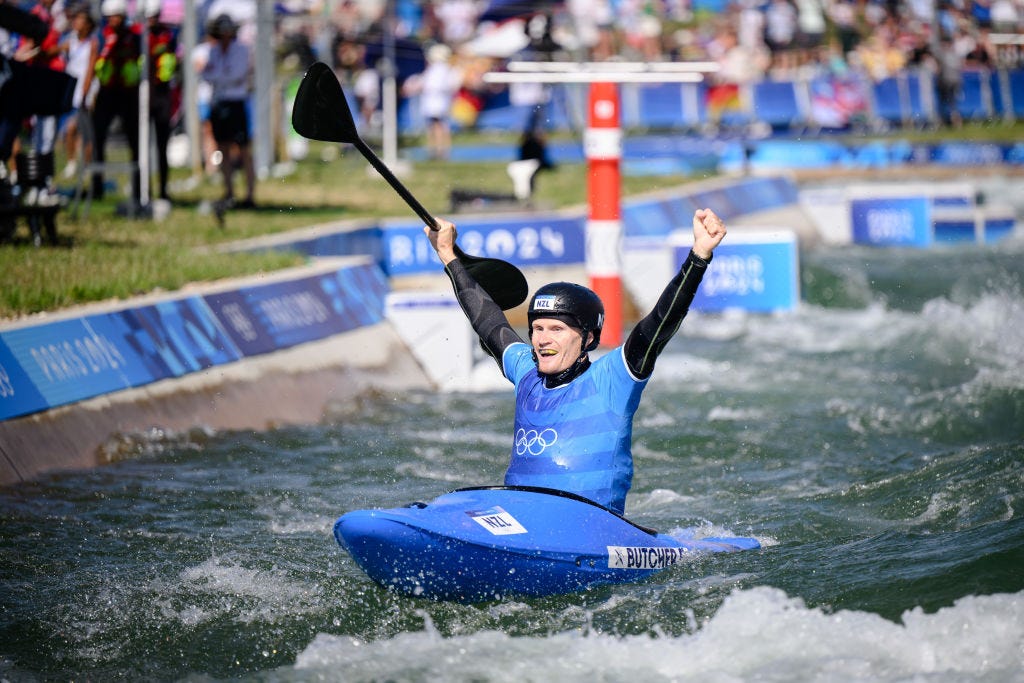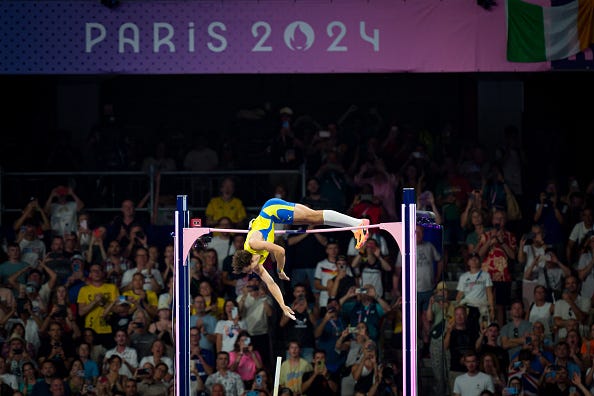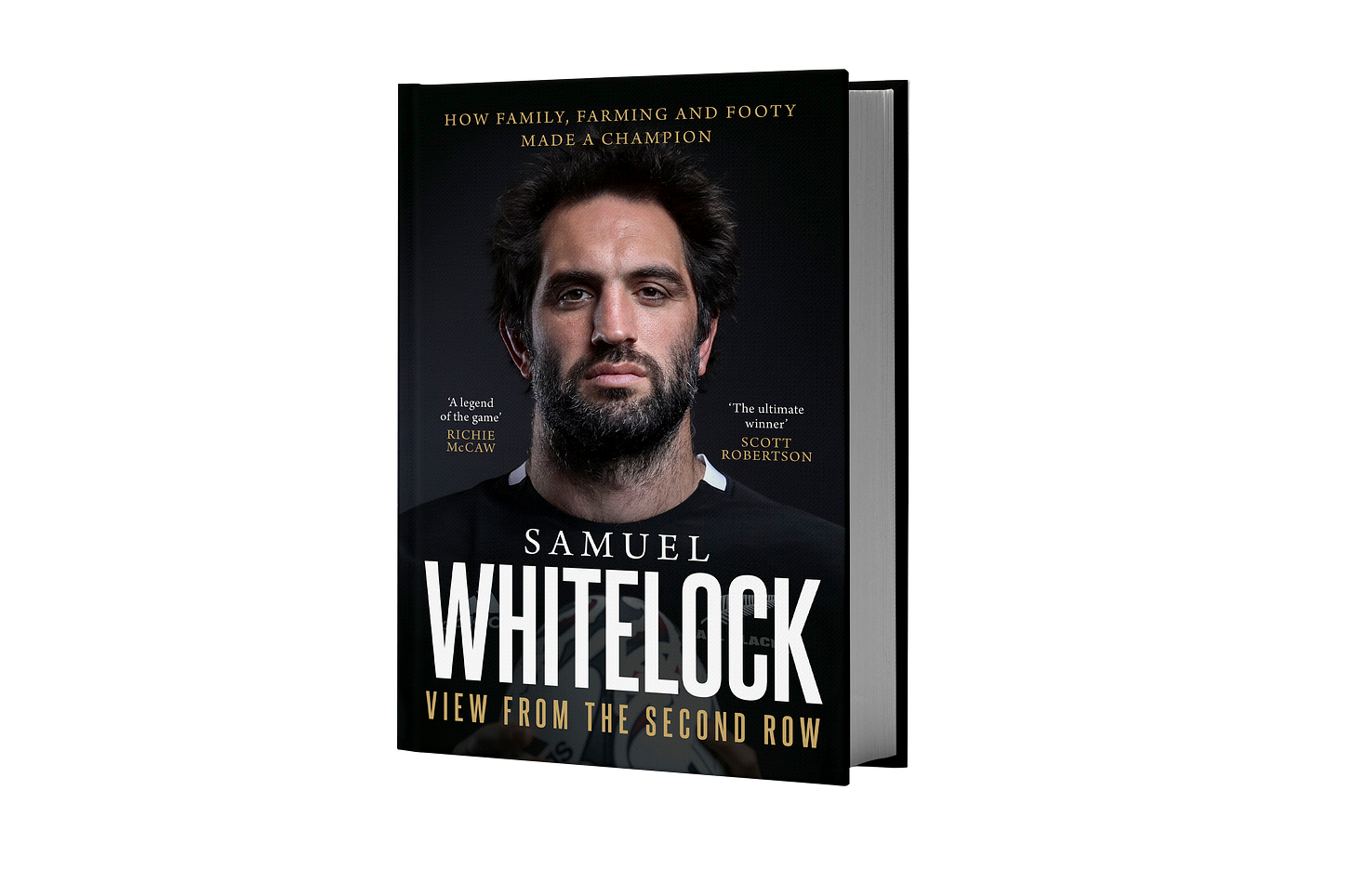Olympique Daily: A sport stew to savour
The Butcher carves his way to gold, silver on the track, craziness in the pole vault, PLUS: a Sam Whitelock book giveaway and SJ retires.
A newsletter that is nearly Olympian and definitely not daily.
Nights like the last are all the evidence you need as to why the Olympics remain the most compelling theatre in sport.
In the space of a couple of hours you have a Kiwi paddler thrashing about in the whitewater in an event conceived about five minutes ago, to a Swedish freak clearing heights never seen before in an event born from those who lived in low-lying areas using pole jumping as a way of crossing marshy land. Speaking of Poles, across town they were flying up walls like spider monkeys on speed, while back at the track we had a feisty clash of the East African giants in a classic 5000m final won by Kenyan Beatrice Chebet.
Throw it all together and you get a wonderful bouillabaisse of sport and what makes it work is its dispensability. Without any offence intended to the athletes at the peak of their powers in their chosen discipline, only a tiny fraction of the population is going to worry about what Finn Butcher is up to in the years between 2025 and Los Angeles 2028, or Aleksandra Miroslaw, or even the spectacularly brilliant and wonderfully named Armand Duplantis.
For a fortnight though, just get a loaf of crusty bread and soak up this marvellous sporting stew.
***
Here, Radio NZ’s Dana Johannsen goes punny in the intro and gets the tone right at the canoe cross.
As he was launched off a two-metre ramp and into Vaire-sur-Marne white water course, New Zealand's Finn Butcher, a first-time Olympian, in a first-time Olympic sport known as a demolition derby on water, was on a collision course with history…
Charging through the finish line to take out the win, Butcher looked back behind him as if he could scarcely believe he won.
After a pregnant pause, the Alexandra kayaker raised his arms in the air and celebrated wildly as his achievement sunk in.
“As I exited the last upstream I was alone in front. It was wild, I just had this massive adrenaline dump, I think I’m still processing it,” an emotional Butcher said, gazing at the gold medal around his neck.
Adrenaline is what the sport’s leaders were counting on when kayak cross was included in the Olympics programme for Paris as part of a shift by the International Olympic Committee (IOC) to include more youth oriented action sports in the Games.
I also liked how Butcher took time out to acknowledge the shoulders of the giant he was standing on. Sometimes this sort of thing can feel forced and insincere, but this rang true.
“[Luuka Jones] has been the gold standard of preparation, of executing when it matters and for us to follow in her footsteps is pretty special. As much as we celebrate me winning this, she has to be celebrated for everything she has done in the sport.”
***
It is impossible to overstate what a bad place the women’s sprint programme at Cycling New Zealand was in a few short years ago.
To see them riding off for gold against the barnstorming Brits was an incredible moment, and there might be more to come for Ellesse Andrews with her specialist keirin to come.
Michael Burgess does a nice job in the Herald here, although the multiple food references revived a formative sporting memory for me, which was my uncle shouting at the TV during a rugby test, “Jesus Quinn, I don’t need to know what the All Blacks had for f***ing breakfast!”
With silver medals around their necks, Ellesse Andrews, Shaane Fulton and Rebecca Petch were walking through the media zone in Paris when they were stopped by a group of international journalists.
As the trio munched on honey sandwiches – “I know, white bread, honey…so Kiwi,” laughed Petch – one English reporter asked the New Zealand women’s team sprint team what everybody in the Saint-Quentin-en-Yvelines Velodrome was thinking.
“There was so much talk about Germany, about China, the Netherlands, other countries – how do you think you have done this?”...
“I feel like these three rides here were our best ever in competition,” said Andrews. “So amazing for us as a day. It did mean that people weren’t watching us as much and we were the underdogs.”
…Their build-up over the past few years hadn’t always been plain sailing, compounded by serious injuries to Fulton and Andrews. But things started to flow from April onwards… as they built towards the Games.
It meant there was quiet confidence on Monday morning, as they sat down to an 8am breakfast of cornflakes, bread, fruit and other cereal.
***
Can we talk with some brutal honesty about the pole vault for a second. While the men soared to great heights in the evening, the women’s qualification event was notable only for a whole lot of low-level bar bashing.
Added to the constant stream of clatters and crashes was a commentary team that seemed to have little to no idea about what was going on other than the fact vaulters were being eliminated left, right and if there’d been a centre, they would have been missing there too. While in most cases this would be inexcusable, neither did the athletes, so they can have a free pass on this one.
In the end, a final field of 12 was whittled down to… 20!... and that includes the three Kiwis Eliza McCartney, who would have made the 12 at any rate, and Imogen Ayris and Olivia McTaggart, who wouldn’t.
Stuff’s Bert van Royen captured the confusion:
Olivia McTaggart had waved goodbye to the crowd.
So had fellow Kiwi pole vaulter Imogen Ayris, who also assumed her third failed attempt to clear the 4.55m bar at the Stade de France had ended her Olympics.
However, as athlete after athlete, spread across two qualifying groups, failed to clear the third height, Ayris sat on the sun-drenched runway and started doing some calculations in her head.
The 23-year-old knew fellow Kiwi and Rio bronze medallist Eliza McCartney was one of 11 vaulters to clear 4.55m, almost certainly propelling her into Thursday morning’s final.
She also figured if a 12th athlete (minimum size of the field for the final) didn’t clear the height, not only would the qualification process end without any athlete needing to come close to attempting the automatic qualifying mark (4.70m), but a countback would be required to fill out the final.
When the last girl missed, I knew that there were a lot of us tied. I wasn’t sure if they were going to take us all through, but when I looked up into the stands and I saw my coach just standing with his arms in the air, I was like, ‘OK we’ve done it, we’ve done it’,’’ Ayris said.
One of the biggest shocks of the night was the failure of the Brits, who are otherwise having a tremendous Olympics, to qualify. In particular, event favourite Molly Caudery, who has vaulted higher than anybody this year, chose not to enter until the bar was set at 4.55m and failed on all three occasions, the anxiety growing with each miss.
She told the BBC: “It’s honestly heartbreaking. Not the experience I was hoping for and I am so sorry for everyone back home. I wish I could have done better, but I am going to try to learn from this and I will take everything I can from it. I felt great, the best shape of my life. I didn’t feel too nervous — I love a big crowd. I don’t know why, but it wasn’t my day.”
I can tell her why — it’s the Olympics, and really, really weird stuff happens.
In a different category to weird (we’ll call it ridiculous), Armand ‘Mondo’ Duplantis makes the pole vault look sublimely easy to the point where it appears like he is using a different pole to every other athlete in the field.
It’s a trick of the mind, though, it’s all about biomechanics, baby. Here, The Athletic/ New York Times ($) breaks it down.
David Young, professor of physics at LSU, explains that elite pole vaulters need four component parts: “The speed of a world-class sprinter, the ability of a long jumper, the agility of a gymnast and the flexibility of a ballerina.”
Chris Mills, a senior lecturer in biomechanics at the University of Portsmouth, breaks this down to The Athletic: “A good vault involves mastery of each phase.” For Duplantis, Mills says, “It is not just one element that he excels at.
“A fast run-up is key as ultimately this will permit a greater grip height (of the pole). The higher you grip, the higher you vault,” says Mills. “Mondo has one of the highest approach speeds on the run-up, he grips high.”...
Mills says it is Duplantis’ “timing on the pole and his ability to transfer the energy from the pole into himself that propels him to the heights that have never been achieved by any other athlete”.
Imagine a coiled spring. “The strain energy in the pole is released and simultaneously the athlete pulls along the line of action to maximise vertical velocity, while maintaining sufficient horizontal velocity, to clear the bar,” says Mills.
The legs shoot straight up as the pole straightens. If the events up until that point were explosive and sprinter-like, Duplantis now becomes half-gymnast, half-ballerina. “Mondo is the perfect mix between strength, finesse and speed.”
The Bounce is proud to have K3 Legal as a partner for 2024. Click on the link to learn more about their legal services.
KIWIS IN ACTION
Times subject to change; * denotes possible involvement
Canoeing, from 7.30pm:
7.30pm: Max Brown/ Grant Clancy/ Kurtis Imrie/ Hamish Legarth (K4 500m heats)
8pm: Lisa Carrington/ Alicia Hoskin/ Olivia Brett/ Tara Vaughan (K4 500m heats)
8.30pm: Brown/ Clancy (C2 500m heats)
9.30pm: Imrie/ Legarth (K2 500m heats)
10.10pm: Carrington/ Hoskin and Aimee Fisher/ Lucy Matehaere (K2 500m heats)
11.10pm: men’s K4 500m QF*
11.50pm: men’s C2 500m QF*
12.10pm: women’s K2 500m QF*
12.30pm: men’s K2 500m QF*
Athletics
8.05pm: Maia Ramsden, 1500m R1
Sailing, from 10pm
Lukas Walton-Keim (kite) races 6-10
Micah Wilkinson/ Erica Dawson (Nacra) races 10-12
Justina Kitchen (kite) races 6-10
Tom Saunders (ILCA 7) medal race
Sport climbing
11pm: Julian David (speed)
Cycling
3.30am: Bryony Botha/ Ally Wollaston/ Emily Shearman/ Nicole Shields/ Samantha Donnelly (team pursuit, one to be omitted), qualifying
5.14am: Aaron Gate/ Campbell Stewart/ Keegan Hornblow/ Tom Sexton/ George Jackson (team pursuit, one to be omitted), 1st round v Belgium
GHOSTWRITING AMA & GIVEAWAY!
Samuel Whitelock: View from the Second Row (HarperCollins)
I have two copies of the All Black legend’s autobiography to offer Bounce ($) subscribers but I’m not just giving them to anybody. Over the next I will run a short extract and a Q&A about the process of writing VFTSR, and the winners will be those whose questions I deem to be the most insightful.
Feel free to drop your questions in the comments below or, if you’re the shy and retiring type, you can email me directly. I’m more interested (and qualified) to answer questions about the writing process than I am about Sam’s CD collection and other trivia, so please bear that in mind.
Ask away (and if nobody has any questions I’ll make some up under nom de plumes like Richard Bachman, Mark Twain and Ayn Rand).
Keen readers of Friday’s newsletter will know that I headed off to Mt Smart on Friday night full of hope and good cheer. I left that crater of masonry feeling pretty pissed off.
Not so much with the performance in the 20-30 loss to a weak Parramatta team, as off-colour and flavourless as it was, but more so with the “game-day experience”. All it did was remind me why I have largely stopped attending night sport, particularly Friday night sport.
Seated in the South Stand, we saw more attacking moves in the bleachers than what the Warriors could muster on the field. On one occasion, security tried to remove an obnoxiously drunk woman, which led to her apoplectic boyfriend (presumably), headlocking the security guard and them toppling down several rows dragging all manner of innocent bystanders into the melee.
At the risk of sounding like a wowser, it was both unedifying and inevitable.
Even before we entered the ground we’d identified an uncommon amount of dangerously drunk and out of it patrons. I’m not talking about a few pre-loading beers and general sloppiness; we’re talking rock-concert levels of ingestion. If ground staff were doing their jobs properly, many of these people should never have been permitted to enter the ground in the first place.
So yeah, we were at least two of the thousands who poured out of the ground 15 minutes early but in our case it wasn’t because the Warriors were losing, or that they were losing particularly badly, it was because we didn’t want to wait around to see what carnage there might be at the final whistle.
As a rule, I love league crowds. There’s a crackle and an energy that is missing from All Black tests. Wins are celebrated like wins, not like a birthright. Losses are shaken off quickly and without a pitiful mourning period The organisation and team at least gives the impression they’re pleased to see you there.
That’s why we’ll keep going back, despite the on-field product that has been pretty desperate this year.
We’ll just be doing it on Sunday afternoons though.
Friday nights? Nah, too old for that crap.
***
It’s tempting to say that Shaun Johnson is going at the right time, but that might have been the end of last season, after his faltering body allowed him one last season of retro brilliance. This year has been a grind, for sure, but that’s not how he should be remembered.
“There’s an entire generation of kids in this country who picked up a rugby league ball because of Shaun Johnson,” said Warriors chief executive Cameron George. “His impact on not only this club, but also rugby league in New Zealand is something that will be remembered here forever.”









I absolutely copped it for this but stand firm in the belief that Shaun Johnson is/was not a top 5 NRL halfback. Yup, last season was great and he had moments of freakish brilliance, but that's just it- they were the exceptions and not the norm.
He was at the helm of our attack throughout the mid 2010s when we were diabolically bad at times. Throughout that time he was the epitome of an 'almost' player- he's ready to pop at any time into greatness: he never really did.
The greats find ways to win regardless: Cronk winning a grand final on one shoulder, JT carrying the Cowboys to a title, even DCE this year leading about a Manly-Warringah team that is bad on paper and was written off by plenty pre season. Yet, he has dragged them into the 8.
Unfortunately, for me, his meltdown after the test loss to Fiji, his leaving when he wasn't offered a massive contract and the 'insider' quote that "he's the highest paid but he's never the first one here and he's never the last one to leave" will always sully his career.
I still love him for the fact he's given so much of his career to the team and he should be celebrated, but the praise he's received from some quarters is hyperbolic IMO.
In regards to SJ, it's an incredibly hard career to encapsulate. Won a Golden Boot, could've/should've won a Dally M, huge rookie year, POTY at Warriors and Sharks...but some not so good stuff in between times. Was he a great of the game? Probably not. Was he exciting as hell? Yes. Was he frustrating as hell as a Warriors fan, and often a lightning rod for our poor form? No doubt.
Revealing stat this year, of the last 14 games we have won 0/7 with Shaun, and 5 of 7 without him (close losses to Raiders + Dogs). 112 points for in those 7 games he played, 180 without. There's a significant case to say TMM should be playing 7, for a host of reasons. But on sentimentality, I guess Shaun will get the spot for the rest of the year.